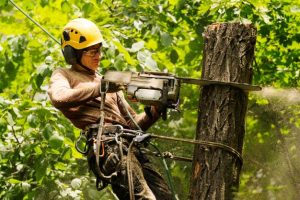The Occupational Safety and Health Administration (OSHA) September 14 announced its Region 1 office has launched a Regional Emphasis Program (REP) for tree care and landscaping operations. Region 1 consists of Connecticut, Maine, Massachusetts, New Hampshire, Rhode Island, and Vermont.
“We are taking this action to raise awareness and improve worker safety in these industries. The emphasis program will focus on the industry’s major hazards – falls, struck-by objects, electrocution, and vehicular and traffic hazards,” Acting Regional Administrator Jeffrey Erskine said in a statement.
“The number of fatalities, injuries and uncontrolled hazards in the tree and landscaping industries in New England is alarming and unacceptable,” Erskine continued. “These incidents are preventable with proper training and effective safety procedures.”
OSHA’s New England regional offices have investigated 31 worker deaths since 2016 in the tree trimming and removal, landscaping, and site preparation industries.
Examples of fatal injuries include:
- A tree branch contacted a live high-voltage power line as a worker in an aerial lift cut it, electrocuting him.
- A falling tree branch struck and killed a worker cutting down oak trees, and a falling tree limb struck an elevated bucket lift, ejecting the worker, whose fall was fatal.
- A log conveyor rolled over a worker performing repairs, crushing and killing him.
The REP begins with an outreach to employers, workers, and stakeholder groups by each OSHA area office in New England before enforcement activities commence in November 2021. This outreach can include presentations, informational mailings, articles in trade newsletters, and other activities. OSHA then will conduct programmed inspections of tree, landscape, and site preparation worksites. OSHA compliance safety and health officers (CSHOs) will also be able to open inspections on the spot if they observe hazardous conditions while traveling past worksites in the course of their duties.
The agency also has a tree care industry rulemaking in the proposed rule stage. Tree care continues to be a high-hazard industry and is currently covered by a patchwork of standards addressing industry hazards. The industry petitioned OSHA for a standard, and the agency issued an advance notice of proposed rulemaking in 2008 and completed a Small Business Regulatory Enforcement Fairness Act (SBREFA) review in May 2020.
The National Institute of Occupational Safety and Health (NIOSH) recently reported that tree care and landscaping workers are at risk for rhabdomyolysis, a rapid breakdown of muscle that can be caused by a number of things, including increased core body temperature and overworking the muscles. After the contents of muscle cells are released into the bloodstream, they can cause damage to many parts of the body, including the heart and kidneys; if it’s not treated promptly, it can result in death or permanent disability.
Hurricane caution
OSHA’s Region 6 office in Dallas cautioned response crews in areas affected by Hurricane Nicholas to recognize the hazards created by fallen trees and storm debris, flooding, power loss, and structural damage.
The regional office urged response and recovery crews to take the following precautions:
- Evaluate work areas for hazards.
- Assess the stability of structures and walking surfaces.
- Ensure fall protection is used when working on elevated surfaces.
- Assume all power lines are live, keep portable generators outside, and never attach a generator directly to the electrical system of a structure unless a qualified electrician has installed a transfer switch for the generator.
- Operate chain saws, ladders, and other equipment properly.
- Use personal protective equipment, such as gloves, hard hats, and hearing protection and foot and eye safeguards.
- Wear light-colored, loose-fitting clothing; have plenty of drinking water available; use sunscreen; and take frequent rest breaks in shaded areas.

